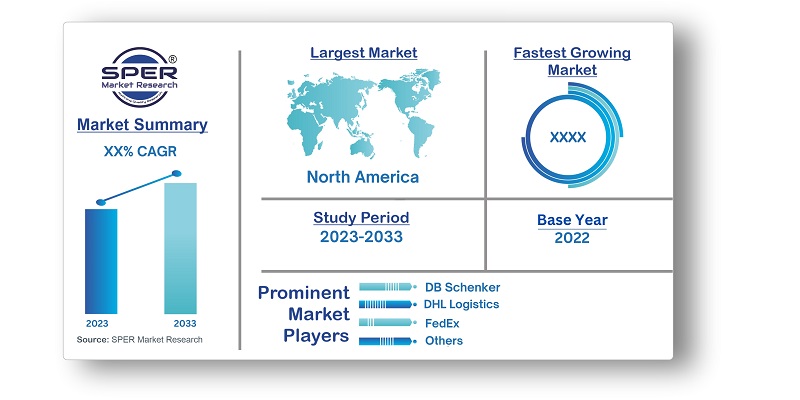
USA E-Commerce Logistics Market Growth, Size, Trends, Share, Competition and Future Challenges
USA E-commerce Logistics Market Size- By Service, Business, By Destination, By Product - Regional Outlook, Competitive Strategies and Segment Forecast to 2033
| Published: Mar-2023 | Report ID: AMIN2357 | Pages: 1 - 106 | Formats*: |
| Category : Automotive & Transportation | |||


| Report Metric | Details |
| Market size available for years | 2019-2033 |
| Base year considered | 2022 |
| Forecast period | 2023-2033 |
| Segments covered | By Service, By Business, By Destination, By Product |
| Regions covered | Northern USA, Southeast USA, Midwest USA, Southwest USA, West USA |
| Companies Covered | DB Schenker, DHL Logistics, FedEx, Geodis Logistics, Kenco Logistics, Kuehne and Nagel Logistics, Rakuten Super Logistics, Saddle Creek Logistics, UPS Supply Chain Solutions, XPO Logistics, Others |
- E-commerce retailers
- Government and regulatory bodies
- Industry associations and trade organizations
- Investors and venture capitalists
- Shipping and courier companies
- Technology providers
- Third-party logistics providers (3PLs)
- Warehouse and fulfilment centres
- USA E-Commerce Logistics Market Value Share and Forecast, By Service 2023-2033
- Transportation
- Value-added Services
- Warehousing and Inventory Management
- USA E-Commerce Logistics Market Value Share and Forecast, By Business 2023-2033
- B2B
- B2C
- USA E-Commerce Logistics Market Value Share and Forecast, By Destination 2023-2033
- Domestic
- International
- USA E-Commerce Logistics Market Value Share and Forecast, By Product 2023-2033
- Beauty and Personal Care Products
- Consumer Electronics
- Fashion Apparel
- Furniture
- Home Appliances
- Midwest USA
- Northern USA
- Southeast USA
- Southwest USA
- West USA
- USA E-commerce Logistics Market Size (FY’2023-FY’2033)
- Overview of USA E-commerce Logistics Market
- Segmentation of USA E-commerce Logistics Market By Service (Transportation, Value-added Services, Warehousing and Inventory Management)
- Segmentation of USA E-commerce Logistics Market By Business (B2B, B2C)
- Segmentation of USA E-commerce Logistics Market By Destination (Domestic, International)
- Segmentation of USA E-commerce Logistics Market By Product (Fashion and Apparel Consumer Electronics, Home Appliances, Furniture, Beauty and Personal Care Products, Other Products)
- Statistical Snap of USA E-commerce Logistics Market
- Growth Analysis of USA E-commerce Logistics Market
- Problems and Challenges in USA E-commerce Logistics Market
- Competitive Landscape in the USA E-commerce Logistics Market
- Impact of COVID-19 and Demonetization on USA E-commerce Logistics Market
- Details on Recent Investment in USA E-commerce Logistics Market
- Competitive Analysis of USA E-commerce Logistics Market
- Key Players in the USA E-commerce Logistics Market
- SWOT Analysis of USA E-commerce Logistics Market
- USA E-commerce Logistics Market Future Outlook and Projections (FY’2023-FY’2033)
- Recommendations from Analyst
1.1. Scope of the report1.2. Market segment analysis
2.1. Research data source2.1.1. Secondary Data2.1.2. Primary Data2.1.3. SPER’s internal database2.1.4. Premium insight from KOL’s2.2. Market size estimation2.2.1. Top-down and Bottom-up approach2.3. Data triangulation
4.1. Driver, Restraint, Opportunity and Challenges analysis4.1.1. Drivers4.1.2. Restraints4.1.3. Opportunities4.1.4. Challenges4.2. COVID-19 Impacts of the USA E-Commerce Logistics Market
5.1. SWOT Analysis5.1.1. Strengths5.1.2. Weaknesses5.1.3. Opportunities5.1.4. Threats5.2. PESTEL Analysis5.2.1. Political Landscape5.2.2. Economic Landscape5.2.3. Social Landscape5.2.4. Technological Landscape5.2.5. Environmental Landscape5.2.6. Legal Landscape5.3. PORTER’s Five Forces5.3.1. Bargaining power of suppliers5.3.2. Bargaining power of buyers5.3.3. Threat of Substitute5.3.4. Threat of new entrant5.3.5. Competitive rivalry5.4. Heat Map Analysis
6.1. USA E-Commerce Logistics Market Manufacturing Base Distribution, Sales Area, Product Type6.2. Mergers & Acquisitions, Partnerships, Product Launch, and Collaboration in USA E-Commerce Logistics Market
7.1. USA E-Commerce Logistics Market Value Share and Forecast, By Service 2023-20337.2. Transportation7.3. Value-added Services7.4. Warehousing and Inventory Management
8.1. USA E-Commerce Logistics Market Value Share and Forecast, By Business 2023-20338.2. B2B8.3. B2C
9.1. USA E-Commerce Logistics Market Value Share and Forecast, By Destination 2023-20339.2. Domestic9.3. International
10.1. USA E-Commerce Logistics Market Value Share and Forecast, By Product 2023-203310.2. Beauty and Personal Care Products10.3. Consumer Electronics10.4. Fashion Apparel10.5. Furniture10.6. Home Appliances10.7. Other Products
11.1. USA E-Commerce Logistics Market Size and Market Share
12.1. USA E-Commerce Logistics Market Size and Market Share by Service (2019-2026)12.2. USA E-Commerce Logistics Market Size and Market Share by Service (2027-2033)
13.1. USA E-Commerce Logistics Market Size and Market Share By Business (2019-2026)13.2. USA E-Commerce Logistics Market Size and Market Share By Business (2027-2033)
14.1. USA E-Commerce Logistics Market Size and Market Share By Destination (2019-2026)14.2. USA E-Commerce Logistics Market Size and Market Share By Destination (2027-2033)
15.1. USA E-Commerce Logistics Market Size and Market Share By Product (2019-2026)15.2. USA E-Commerce Logistics Market Size and Market Share By Product (2027-2033)
16.1. USA E-Commerce Logistics Market Size and Market Share By Region (2019-2026)16.2. USA E-Commerce Logistics Market Size and Market Share By Region (2027-2033)16.3. Midwest USA16.4. Northern USA16.5. Southeast USA16.6. Southwest USA16.7. West USA
17.1. DB Schenker17.1.1. Company details17.1.2. Financial outlook17.1.3. Product summary17.1.4. Recent developments17.2. DHL Logistics17.2.1. Company details17.2.2. Financial outlook17.2.3. Product summary17.2.4. Recent developments17.3. FedEx17.3.1. Company details17.3.2. Financial outlook17.3.3. Product summary17.3.4. Recent developments17.4. Geodis Logistics17.4.1. Company details17.4.2. Financial outlook17.4.3. Product summary17.4.4. Recent developments17.5. Kenco Logistics17.5.1. Company details17.5.2. Financial outlook17.5.3. Product summary17.5.4. Recent developments17.6. Kuehne and Nagel Logistics17.6.1. Company details17.6.2. Financial outlook17.6.3. Product summary17.6.4. Recent developments17.7. Rakuten Super Logistics17.7.1. Company details17.7.2. Financial outlook17.7.3. Product summary17.7.4. Recent developments17.8. Saddle Creek Logistics,17.8.1. Company details17.8.2. Financial outlook17.8.3. Product summary17.8.4. Recent developments17.9. UPS Supply Chain Solutions17.9.1. Company details17.9.2. Financial outlook17.9.3. Product summary17.9.4. Recent developments17.10. XPO Logistic17.10.1. Company details17.10.2. Financial outlook17.10.3. Product summary17.10.4. Recent developments17.11. Others
SPER Market Research’s methodology uses great emphasis on primary research to ensure that the market intelligence insights are up to date, reliable and accurate. Primary interviews are done with players involved in each phase of a supply chain to analyze the market forecasting. The secondary research method is used to help you fully understand how the future markets and the spending patterns look likes.
The report is based on in-depth qualitative and quantitative analysis of the Product Market. The quantitative analysis involves the application of various projection and sampling techniques. The qualitative analysis involves primary interviews, surveys, and vendor briefings. The data gathered as a result of these processes are validated through experts opinion. Our research methodology entails an ideal mixture of primary and secondary initiatives.



Frequently Asked Questions About This Report
PLACE AN ORDER
Year End Discount
Sample Report
Pre-Purchase Inquiry
NEED CUSTOMIZATION?
Request CustomizationCALL OR EMAIL US
100% Secure Payment






Related Reports
Our Global Clients
Our data-driven insights have influenced the strategy of 200+ reputed companies across the globe.




















